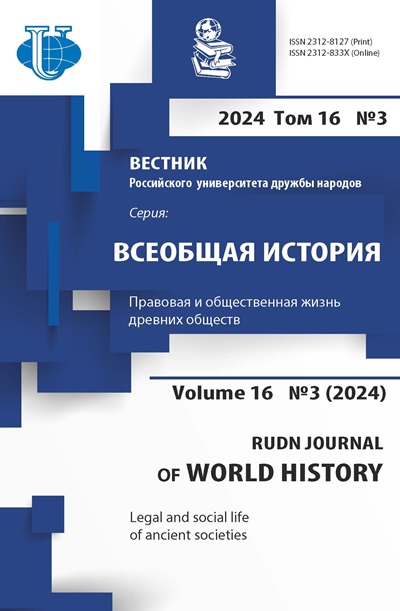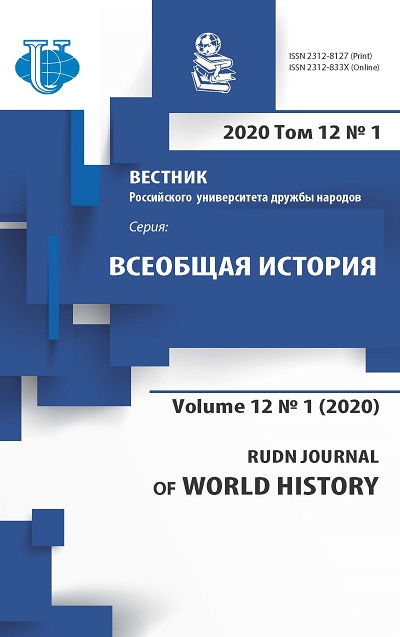Vol 12, No 1 (2020)
- Year: 2020
- Articles: 8
- URL: https://journals.rudn.ru/world-history/issue/view/1336
- DOI: https://doi.org/10.22363/2312-8127-2020-12-1
Full Issue
Discussions
The world of concentration camp in Nazi Germany. The main features of the phenomenology of the unknown
Abstract
The system of concentration camps of Nazism, despite the abundance of special literature on this topic, is a phenomenon that only today historical science begins to reveal to itself. The inner world of the prisoners in the camps, the mental, psychological and physical conditions in which the prisoners found themselves, was and remains a particularly difficult area for researchers. This is due to the fact that one of the most difficult problems faced by the researcher of the phenomenology of the Concentration world is directly the problem of understanding this phenomenon. Is it possible to understand this phenomenology, and if so, to what extent? The article attempts to answer this question based on the consideration of the various conditions of the prisoner in the camp.
 7-16
7-16


The problem of illegal migration in Italian Mediterranean politics
Abstract
 17-27
17-27


African Studies
The history of the Notion of the State in West Africa: from the destruction of empires to the emergence of the modern state resulting from colonization (the case of the Mali Empire)
Abstract
 28-34
28-34


Oriental Studies
The impact of the China-Africa cooperation Forum on the deepening of relations between China and Africa
Abstract
The Sino-African cooperation forum largely determines the trajectory of cooperation between Chinese and African countries. Being established in 2000, it facilitated the institutionalisation of the interactions between China and its African partners. Throughout twenty years of FOCAC functioning, the parties have successfully held a number of forums, which have significantly expanded the scope of cooperation. At present, a big number of scientific works are devoted to research the increase of the Chinese presence in Africa, on the other hand there is quite a few works done on FOCAC activities research, which predetermined the choice of this topic. In addition, analysis of the FOCAC performance results that have been reached by the 20th anniversary are of a certain interest. In this article, the author will identify the reasons for the parties’ interest in institutionalizing the interaction between China and Africa, will reveal promising areas of cooperation, as well as will analyze the impact of the Beijing FOCAC Action Plan for 2019-2021 to expand cooperation between China and the countries of the African continent.
 35-46
35-46


Economic and social measures of Narendra Modi’s government to solve the problem of separatism in North - Eastern India (NER)
Abstract
 47-59
47-59


History of culture
The palace and fortress complex Alhambra and Generalife as cultural heritage and tourist resource
Abstract
The article analyzes the problem of using cultural heritage sites as tourist resources on the case of the architectural and park complex of the Alhambra and Generalife in Granada, the second most visited monument in Spain. The author refers to problems and issues related to the difficulties of conservation, restoration and interpretation of the complex and management of tourist flows. The administration of a complex cultural heritage site such as the Alhambra and the Generalife requires a mandatory multidisciplinary approach, involving specialists from different areas.
 60-71
60-71


Some aspects of museums influence on the formation of historical memory
Abstract
Museums are one of the most complex institutions of our time, which concentrate the implementation of many functions. One of them could be described as the formation of historical memory. The implementation of this function is associated with many aspects of a heterogeneous nature. The purpose of this article is to reveal these aspects. What was written in this article should be primarily attributed to historical museums, since they are precisely those institutions that are most closely interconnected with the concept of historical memory and historical knowledge. The aspects of historical memory formation discussed in this article will be described in the memory studies paradigm.
 72-80
72-80


Iberoamerican Studies
The Second Declaration of Havana as the Political Manifest of the Socialistic Stage of the Cuban Revolution
Abstract
The Second Declaration of Havana ratified on February 4, 1962 is the most important document of the socialistic stage of the Cuban Revolution. The historical analysis of this document is essential to appreciate all the peculiarity of the socialism formation in Cuba and to understand the origin of the principles of the revolutionary internationalism during the Cuban Revolution. However, investigations, which are dedicated to specifically this issue, does not present in the Russian historiography. The aim of this work is to clarify the role of the Second Declaration of Havana in the process of the socialistic ideology formation in Cuba under specific historical conditions of the first half of the 20th century and also to estimate the impact of the foreign policy of USA and VIII Consultative Meeting of Foreign Ministers of the Organization of American States (OAS), which took place in January 1962, onto the radicalization of the Cuban Revolution.
 81-91
81-91
















